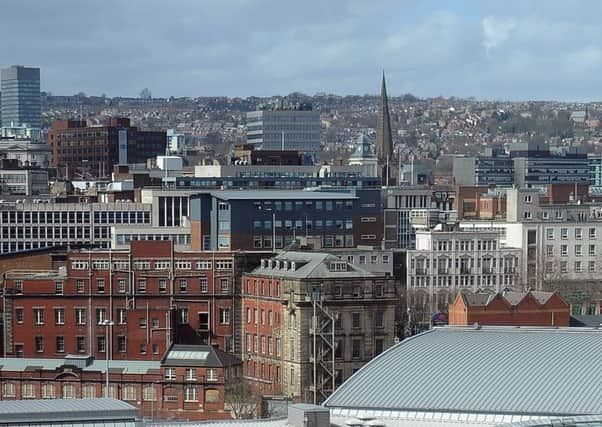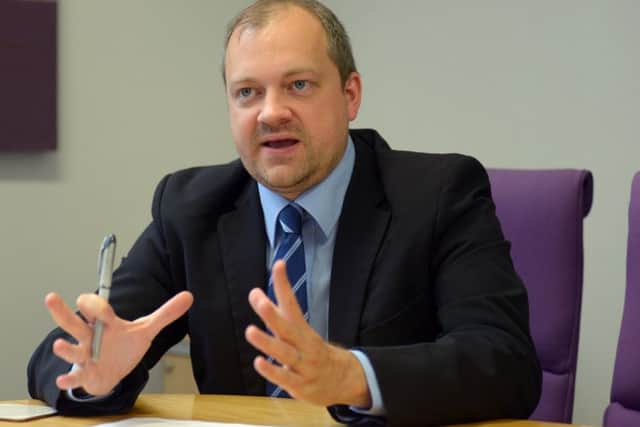It's time to clear the air - Sheffield wants to tackle vehicle pollution


For a cynical few, it represents “yet another attempt to filch the motorist of even more money”. But for the vast majority who responded to a recent consultation, plans to start handing out fines to drivers in Sheffield who leave their car engines running outside schools are a more than welcome step in tackling what is being termed a “public health emergency”.
If the policy is implemented by Sheffield Council, it would become only the second local authority in the country to bring in fines for motorists who leave engines idling, following in the footsteps of Westminster Council. And with other councils in Yorkshire under pressure to draw plans to reduce illegal air pollution levels as soon as possible, the success of the scheme is likely to be watched closely across the county.
Advertisement
Hide AdAdvertisement
Hide AdWhile details and dates of Sheffield’s fining regime are yet to be confirmed, the Westminster model involves drivers being penalised if they leave engines running for more than a minute after parking up. Offenders get three written warnings before fines of £80 are issued.


It is intended the Sheffield scheme will initially only apply outside schools, before being rolled out to include hospitals and care homes and then finally the city as a whole.
Councillor Jack Scott, cabinet member for transport and infrastructure, says: “We know that poor air is a public health emergency across the country. We cannot sit by and let this obvious danger to people’s health go unnoticed. We need to be bold and ambitious in tackling it to protect the health of the most vulnerable. Sheffield is potentially only the second city in the country to take this level of action on such a huge UK problem.”
While the idea was not universally welcomed during a recent public consultation, with more than one person describing it as an excuse to make money from motorists, the policy was backed by the vast majority of the 1,000 people who responded.
Advertisement
Hide AdAdvertisement
Hide AdOne person who lives near a school said: “Parents sit for 15 minutes with their car engines still running. I do like to have my windows and balcony door open but, as soon as it is 2.30pm, I have to close them as my flat fills with fumes. I suffer from asthma and the build up of fumes affects my breathing.”


But the council admits the “common-sense” idea will only form one strand of the action they must take to reduce levels of dangerous nitrogen dioxide in the atmosphere. In recent days, it has also confirmed plans to reduce the speed limit on hundreds of roads in the city centre down to 20mph.
But for many environmental campaigners in the city, the wait for substantial action has been going on too long – especially as figures suggest more than 500 people a year in Sheffield are dying prematurely as a result of poor air quality.
Sheffield, along with Rotherham and Leeds, was among 29 councils persistently exceeding air pollution levels ordered by the Government in the summer to “develop innovative local plans” that would bring emissions levels down to the statutory limits within the shortest possible time.
Advertisement
Hide AdAdvertisement
Hide AdThat demand came about after the Government itself was ordered by judges to clean up the country’s illegal levels of air pollution after losing two court cases against the ClientEarth charity. The latter organisation described the Government’s strategy as “passing the buck to local authorities”.
While this criticism was echoed by Sheffield Council, it did subsequently accept a £100,000 Government grant to set up a feasibility study into the possibility of setting up a ‘Clean Air Zone’ in the city.
But this is far from the first attempt to take action to tackle the city’s air quality problems. The whole of the urban area of Sheffield was declared an Air Quality Management Area in 2010 and in July 2012, the council agreed a strategy designed to bring pollution levels down to legal limits by 2015.
But it did not succeed. A council report in 2016 said: “It is quite clear that air quality in Sheffield has not improved.”
Advertisement
Hide AdAdvertisement
Hide AdIn 2014, councillors gave the green light to the building of a new Ikea store close to the Meadowhall shopping centre in the area of Tinsley, where there were already existing pollution problems. The council’s then-director of public health warned extra car journeys created by the site would “lead to a small number of additional premature deaths” and contribute to increased cases of cases of respiratory and cardiovascular disease. But it was deemed that the economic benefits the store would offer outweighed the health concerns.
In summer 2015, Sheffield became the first place in England to agree to move the location of two schools in Tinsley close to the M1 motorway to a new site because of concerns about how air pollution was affecting pupils.
Neil Parry, from the East End Quality of Life Initiative, which has been highlighting problems with air pollution in areas such as Tinsley for years, says the vehicle idling policy is a step in the right direction – but much more needs to be done.
“This is not a game-changer but it does help to get people talking about the issue. It is a positive thing to do and it really needs to get going. In general, the city has been slow in terms of doing things on air pollution. People are calling it a public health emergency. What ‘emergency’ suggests is the need for some urgency but I’m not seeing any. There is plenty of talk but when is it going to happen?
Advertisement
Hide AdAdvertisement
Hide Ad“There is this misplaced idea that doing something positive about air quality is anti-car and bad for business. But it should not be seen as a case of either-or. Sheffield is definitely one of those cities, like Leeds, where they have really got to get their act together on this issue.”
Parry says tram lines could be extended across Sheffield to help tackle air pollution, but adds the idea of charging high-polluting vehicles for getting into the city centre should also be under consideration.
Beatrice Greenfield, from Sheffield Friends of the Earth, says she hopes the vehicle idling strategy could bring about similar changes in behaviour seen with the plastic bag charge in supermarkets.
She says she understands the policy will not be universally popular, but believes difficult decisions have to be made.
Advertisement
Hide AdAdvertisement
Hide Ad“Whatever the council do will always be damned by someone. There will always be a trade-off. But the Government needs to have a proper strategy on air pollution. All they have done is pass the buck on the city councils who are struggling after having their budgets cut.”
The currently-imposed limits are set by the EU and Parry says it is vital Brexit is not used as an excuse by the Government to abandon attempts to reduce pollution levels.
“The limits are not just numbers plucked out of the sky. It is there to protect people’s health and wellbeing.”
Fines system will ‘alter behaviour’
motorists will soon change their behaviour if they know they could be fined for leaving their engines running outside schools, a councillor has suggested.
Advertisement
Hide AdAdvertisement
Hide AdCouncillor Jackie Drayton, Cabinet Member for Children, Young People and Families, said she was pleased there had been “overwhelming support” for the idea of introducing the policy.
“Improving the health of children and young people really does make a difference to the their quality of life, into adulthood,” she said.
“That’s why I believe that once people become aware that leaving engines running when parked outside schools is a real danger to children’s health, that all drivers will decide to make a difference and take the easy step of switching their engines off.”